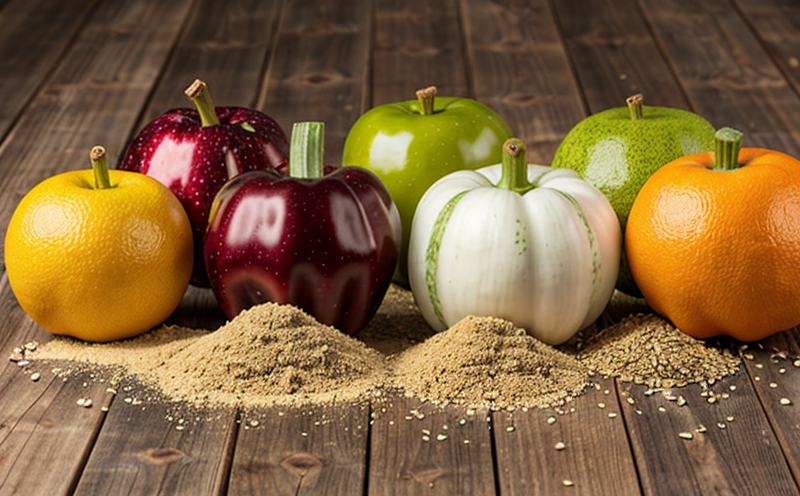ISO 6887-1 Sample Preparation for Microbiological Analysis in Fruits
The ISO 6887 series is a set of international standards designed to provide guidelines on the sampling and preparation of food products, including fruits, for microbiological analysis. The first part of this standard, ISO 6887-1:2019, specifies general principles applicable to all parts of the series, which includes detailed procedures for sample collection, transport, preservation, and preparation.
Microbiological testing in fruits is crucial not only for ensuring food safety but also for maintaining consumer confidence. Fruit products are susceptible to contamination from various sources such as soil, water, and human contact during harvesting, processing, or handling. Therefore, proper sample preparation according to ISO 6887-1 ensures that the test results accurately reflect the microbial content of the fruit.
The process begins with selecting a representative sample from the production lot. This is critical because it affects the reliability of the microbiological analysis. The sample should be taken in a manner that minimizes contamination and degradation, which can lead to inaccurate or misleading results. Once collected, the samples need to be transported under controlled conditions to avoid microbial growth and ensure integrity.
After transport, the samples undergo rigorous preparation steps outlined in ISO 6887-1:2019. These steps include homogenization of the sample, dilution, and plating techniques that allow for enumeration of viable microorganisms present. Proper aseptic technique is paramount during these procedures to prevent contamination by external microbes.
The choice of media used in the plating process plays a significant role in identifying specific types of bacteria, fungi, or yeasts present in the fruit sample. Different media have different selective properties that target particular genera or species, ensuring accurate identification and quantification. This step is essential for detecting potential pathogens like Listeria monocytogenes, Salmonella spp., or Escherichia coli O157:H7.
Following incubation periods suitable for the growth of targeted microorganisms, colonies are counted and identified using microscopic examination and biochemical tests if necessary. The results provide critical insights into the microbial quality of the fruit product, aiding in compliance with food safety regulations and industry standards like Codex Alimentarius.
The meticulous adherence to ISO 6887-1 ensures that the analytical data generated is robust, reproducible, and internationally comparable. This standardization supports continuous improvement processes within production facilities by providing a consistent benchmark against which product quality can be measured.
Why It Matters
Adhering to ISO 6887-1 is not just about meeting regulatory requirements; it's also about protecting public health and maintaining brand reputation. In the context of fruit microbiology testing, compliance with this standard helps in minimizing risks associated with foodborne illnesses caused by pathogens.
Consumers expect high standards from the brands they purchase, especially when it comes to food products. By ensuring that all samples are prepared correctly according to ISO 6887-1 guidelines, producers demonstrate their commitment to quality and safety. This can enhance consumer trust and loyalty, which is vital in today’s competitive market.
From a regulatory perspective, compliance with international standards like ISO helps companies avoid penalties associated with non-compliance and ensures they meet the expectations of importing countries. Many national governments have adopted these standards as part of their food safety frameworks, making adherence mandatory for exporters.
In addition to regulatory considerations, there are economic benefits too. Efficient sample preparation reduces waste by minimizing the risk of spoilage during transport or storage, leading to cost savings. Moreover, accurate and reliable testing results contribute to better resource management within production processes, potentially reducing costs further.
Lastly, maintaining consistent quality across different batches and locations enhances brand image and competitiveness. It allows companies to maintain a high standard of product excellence that satisfies both domestic and international markets.
Eurolab Advantages
At Eurolab, we pride ourselves on delivering top-notch services supported by our extensive experience in food safety testing. Our expertise in fruit microbiology testing is reflected in the precision and reliability of our services provided according to ISO 6887-1 standards.
We offer a comprehensive range of services that cater specifically to your needs, whether you're looking at basic compliance checks or detailed analytical investigations. Our team comprises highly qualified professionals who have extensive knowledge and experience in handling various types of fruit samples.
Our state-of-the-art laboratory facilities are equipped with the latest technology and equipment required for accurate sample preparation and analysis. This ensures that we consistently deliver high-quality results every time, ensuring you get reliable data on which to base your decisions confidently.
We understand the importance of timely delivery in the food industry, so our turnaround times are typically faster than those offered by many other labs. Additionally, we provide detailed reports tailored specifically for each client, offering clear interpretations along with actionable recommendations based on findings.
At Eurolab, we take pride in providing not just good service but excellent service that sets us apart from others. With our commitment to excellence and continuous improvement, you can rest assured that your samples will be handled expertly throughout every stage of analysis.
Use Cases and Application Examples
| Use Case | Description |
|---|---|
| Fresh Fruit Import Compliance | Ensuring imported fresh fruits meet the microbiological standards set by importing countries. |
| Quality Control in Production Facilities | Implementing regular checks to monitor and improve microbial quality during production processes. |
| Product Recall Investigations | Identifying root causes of contamination that could lead to product recalls, ensuring safety measures are implemented effectively. |
| New Product Development | Testing new formulations or ingredients for potential microbial risks before they reach the market. |
| Supply Chain Verification | Verifying compliance throughout the supply chain to ensure all stages follow strict hygiene practices and standards. |
| Consumer Safety Audits | Conducting audits aimed at enhancing consumer safety by identifying any potential hazards early on in the production process. |
| Preparation for Certification Programs | Aiding companies preparing themselves to meet specific certification programs that require stringent microbiological standards. |





